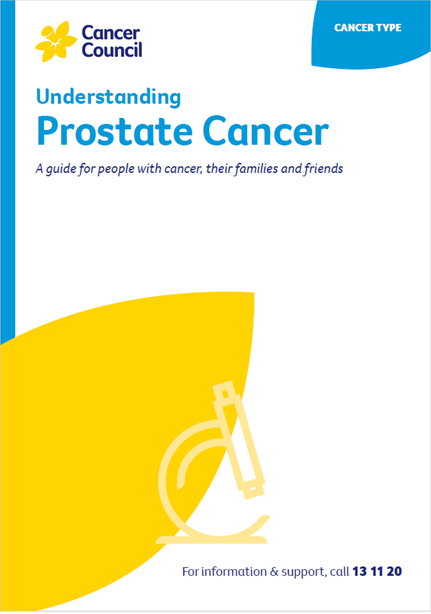- Home
- Prostate cancer
- Management and treatment
- Surgery
- What to expect after surgery
What to expect after surgery
This is a general overview of what to expect after surgery. Everyone will respond to surgery differently, depending on the type of surgery they have and their general health and wellbeing.
Learn more about:
After surgery for prostate cancer
| Recovery time | No matter which surgical method is used, a radical prostatectomy is major surgery and you will need time to recover. You can expect to return to your usual activities within about 6 weeks of the surgery. Usually you can start driving again in a couple of weeks, but heavy lifting should be avoided for 6 weeks. |
| Managing pain and discomfort | It’s common to have pain after the surgery, so you may need pain relief for a few days. |
| Having a catheter | You will have a thin, flexible tube (catheter) in your bladder to drain your urine into a bag. The catheter will be removed after 1–2 weeks once the wound has healed. |
Side effects of prostate cancer surgery
Nerve damage
The nerves needed for erections and the muscle that controls the flow of urine (sphincter) are both close to the prostate. It may be very difficult to avoid these during surgery, and any damage can cause problems with erections and bladder control. Sometimes the nerves will need to be removed to try to ensure all cancer is removed.
Loss of bladder control
You can expect to have some light dribbling or trouble controlling your bladder for some weeks to months after a radical prostatectomy. This is known as urinary incontinence or urinary leakage. You can use continence pads to manage urinary leakage.
Bladder control usually improves in a few weeks and will continue to get better for up to a year after the surgery. In the long term, you might continue to have some light dribbling. Some people may consider having an operation to fix urinary incontinence. In rare cases, people have no control over their bladder.
For help managing these problems, see Urinary problems.
Changes in erections
Problems getting and keeping erections after prostate surgery are common. This is often called erectile dysfunction (ED) or impotence. Erections may improve over months to a few years. It’s more likely you won’t get strong erections again if erections were already difficult before the operation.
For more information, see managing erection problems.
Changes in ejaculation
During a radical prostatectomy, the tubes from the testicles (vas deferens) are sealed and the prostate and seminal vesicles are removed. This means semen is no longer ejaculated during orgasm (a dry orgasm). Your orgasm may feel different – in some cases it may be uncomfortable or, rarely, painful. A small amount of urine may leak during orgasm (which isn’t harmful to your partner).
Infertility
A radical prostatectomy will cause infertility and you will not be able to conceive a child without medical assistance. If you wish to have children, talk to your doctor before treatment about sperm banking or other options.
Changes in penis size
You may notice that your penis gradually becomes a little shorter after surgery. Talk to your doctor about whether vacuum erection devices and prescription medicines may help. A change to the size of your penis can be difficult to deal with.
Call Cancer Council 13 11 20 for ways to get support.
For more information about preparing for surgery and what to expect during and after, see our general section on Surgery or call Cancer Council 13 11 20.
→ READ MORE: Radiation therapy for prostate cancer
Podcast: Sex and Cancer
Listen to more of our podcast for people affected by cancer
More resources
Prof Declan Murphy, Consultant Urologist, Director – Genitourinary Oncology, Peter MacCallum Cancer Centre and The University of Melbourne, VIC; Alan Barlee, Consumer; Dr Patrick Bowden, Radiation Oncologist, Epworth Hospital, Richmond, VIC; Bob Carnaby, Consumer; Dr Megan Crumbaker, Medical Oncologist, St Vincent’s Hospital Sydney, NSW; Henry McGregor, Health Physiotherapist, Adelaide Men’s Health Physio, SA; Jessica Medd, Senior Clinical Psychologist, Department of Urology, Concord Repatriation General Hospital and Headway Health, NSW; Dr Gary Morrison, Shine a Light (LGBTQIA+ Cancer Support Group); Caitriona Nienaber, 13 11 20 Consultant, Cancer Council WA; Graham Rees, Consumer; Kerry Santoro, Prostate Cancer Specialist Nurse Consultant, Southern Adelaide Local Health Network, SA; Prof Phillip Stricker, Chairman, Department of Urology, St Vincent’s Private Hospital, NSW; Dr Sylvia van Dyk, Brachytherapy Lead, Peter MacCallum Cancer Centre, VIC.
View the Cancer Council NSW editorial policy.
View all publications or call 13 11 20 for free printed copies.


